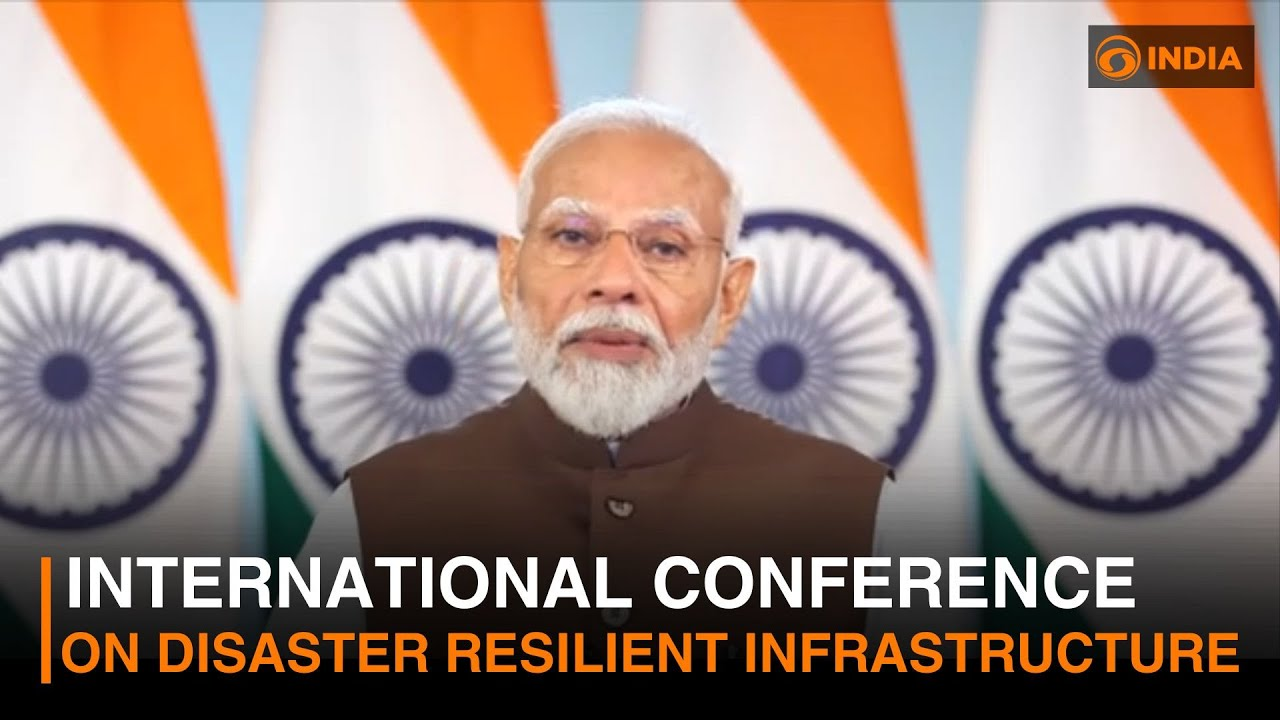
Copyright infringement not intended
Picture Courtesy: https://www.youtube.com/watch?v=x4y_2c5NpQQ
Context: The Prime Minister of India highlighted the importance of investing in disaster-resilient infrastructure during the 6th International Conference on Disaster Resilient Infrastructure (ICDRI), organised at Bharat Mandapam in New Delhi.
Key Highlights from the address
Importance of Disaster Resilient Infrastructure
- The PM strongly emphasised the critical need to invest in making infrastructure disaster-resilient to secure a better future.
- He highlighted that resilience can no longer be an afterthought - it must be a core design principle when creating new infrastructure projects across sectors like housing, transportation, utilities, energy etc.
- Resilience should be the key priority even when rebuilding in the aftermath of disasters. The rebuilding phase is an opportunity to make the new infrastructure more resilient to future disasters right from the start.
Need for Collective Global Resilience
- The Prime Minister highlighted that disasters do not respect national borders in today's interconnected world. A disaster in one part of the world can potentially disrupt global supply chains, trade flows, financial systems and more. Therefore, individual national resilience is insufficient - what is required is collective global resilience against shared risks.
- Shared resilience can only be achieved if each nation first builds strong resilient infrastructure and disaster management capabilities domestically.
Supporting the Vulnerable
- The PM recognized that resilience cannot be built equitably without extending specific support to the most vulnerable nations facing high disaster risks.
- He lauded CDRI's dedicated program aimed at funding resilient infrastructure projects across 13 small island developing states that are most susceptible to climate impacts, sea level rise and related disasters.
- Citing examples like resilient housing in Dominica, resilient transport corridors in Papua New Guinea, and enhanced early warning systems in the Dominican Republic and Fiji, the PM expressed satisfaction at CDRI's focus on empowering the Global South to build resilience and adapt to disasters.
India's Initiatives
- The PM highlighted the formation of a new Disaster Risk Reduction Working Group under India's G20 Presidency. With financing as its core focus area, this group's discussions and outcomes will play a key role in shaping a resilient future globally.
- The combination of CDRI's expansion into a truly global coalition now spanning 39 countries and the G20's strengthened focus on disaster resilience will provide a solid platform to take the world towards the crucial goal of shared resilience against shared risks.

International Conference on Disaster Resilient Infrastructure (ICDRI)
- The International Conference on Disaster Resilient Infrastructure (ICDRI) serves as a vital platform for advancing discussions and actions related to disaster and climate-resilient infrastructure.
Purpose and Objectives
- ICDRI aims to foster global cooperation and knowledge sharing among policymakers, researchers, and practitioners in the field of disaster and climate-resilient infrastructure.
- The conference promotes research, innovation, and collaboration to enhance infrastructure risk management, standards development, financing strategies, and recovery mechanisms.
Annual Event
- ICDRI is held annually, providing a recurring opportunity for stakeholders to engage, exchange ideas, and showcase initiatives that contribute to resilient infrastructure development.
- The conference facilitates ongoing dialogue and action on critical issues related to disaster resilience and infrastructure adaptation.
ICDRI and its Membership
- It was launched by India at the 2019 UN Climate Summit.
- It includes a diverse group of member countries committed to promoting disaster-resilient infrastructure. Member countries range from Afghanistan and Bhutan to France, Japan, and the United States.
- It has strong support from international organisations such as The World Bank Group, Asian Development Bank, UNDP, UNDRR, ARISE, and CCRI, which play crucial roles in advancing resilience-building efforts globally.
Global Engagement and Collaboration
- ICDRI serves as a global platform for promoting partnerships, collaboration, and joint initiatives aimed at addressing infrastructure challenges posed by climate change and natural disasters.
- Through shared experiences and expertise, participants at ICDRI work towards developing innovative solutions and policies to strengthen disaster resilience in infrastructure.
Knowledge Sharing and Capacity Building
- The conference facilitates the dissemination of best practices, research findings, and lessons learned in disaster-resilient infrastructure.
- It promotes capacity building and the development of technical skills necessary for implementing effective resilience strategies in infrastructure planning and development.
Conclusion
- The Prime Minister's address laid out a comprehensive roadmap for the world to urgently prioritise investment in disaster-resilient infrastructure not just for economic reasons, but to uphold human security, equity and global stability in an era of systemic risks and cascading disasters. His speech powerfully made the case that resilience can no longer be deferred or treated as an afterthought if humanity is to thrive in the face of increasing calamities.
Must Read Articles:
International Conference on Disaster Resilient Infrastructure
International Conference on Disaster Resilient Infrastructure
Source:
PIB
|
PRACTICE QUESTION
Q. Disaster preparedness requires investments in infrastructure and resources that may not be utilised frequently. How to strike a balance between mitigating potential disaster impacts and the economic burden of maintaining a high level of preparedness?
|




